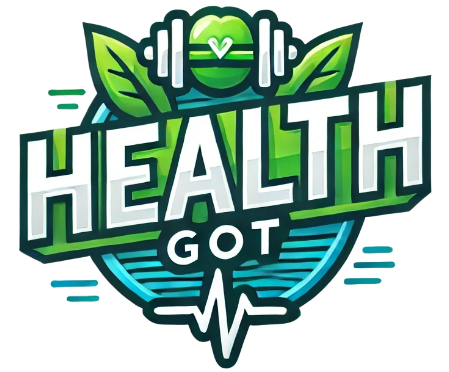Table of Contents
Introduction to Depression and the Need for Treatment
Depression is one of the most common mental health disorders, affecting millions worldwide. It is a complex condition that goes beyond occasional sadness, profoundly impacting mood, behavior, thoughts, and physical health.

Symptoms of Depression
- Persistent feelings of hopelessness
- Difficulty concentrating
- Constant fatigue
- Loss of interest in activities once loved
- Changes in appetite
- Sleep disturbances
- Unexplained physical pains or aches
These symptoms can make daily life overwhelming, affecting work, relationships, and personal goals. Recognizing these signs is the first step toward recovery.
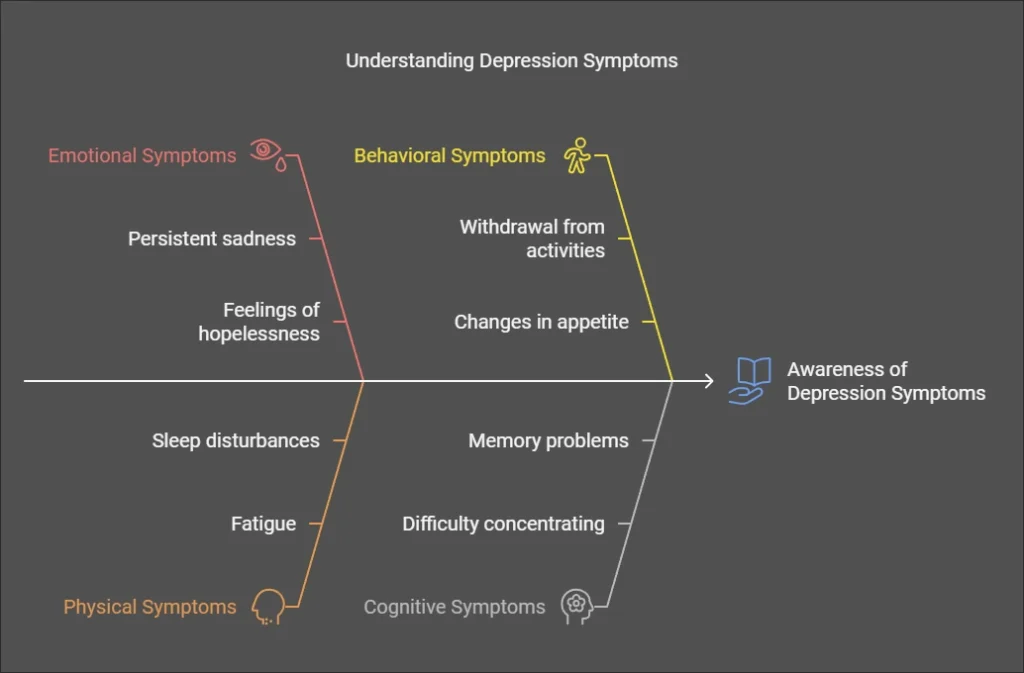
Taking the First Step
The good news? You’re not alone. Help is always within reach.
- Reflect on how you’re feeling.
- Reach out to a trusted friend, family member, or mental health professional.
Understanding the signs is essential to finding the support and resources you need.

The Role of Advanced Practice Nurses (APNs) in Depression Treatment
Advanced Practice Nurses (APNs) are pivotal in providing effective, compassionate care for individuals experiencing depression. Their holistic approach ensures personalized treatment that addresses both emotional and physical needs.

Why APNs are Essential
- Individualized Care
- APNs take time to understand each patient’s unique challenges.
- They create customized treatment plans, avoiding a “one-size-fits-all” approach.
- Expertise in Medication Management
- With in-depth knowledge of psychopharmacology, APNs prescribe and adjust medications to find the right balance for each patient.
- Use of Evidence-Based Therapies
- Cognitive-behavioral therapy (CBT)
- Mindfulness-based strategies
These therapies help patients build resilience and regain control of their lives.

Comprehensive and Holistic Support
APNs address both the emotional and physical aspects of depression, helping patients improve their overall quality of life. Their dedication makes them an essential part of the recovery journey, offering hope and support every step of the way.

Understanding Depression and the Role of Depression Treatment APNs
Types of Depression
Understanding Depression: A Personal Experience
Depression isn’t one-size-fits-all. It takes many forms, each with unique symptoms and challenges. For some, it manifests as persistent feelings of sadness, emptiness, or hopelessness. Others may experience irritability, fatigue, or trouble concentrating. From major depressive disorder to seasonal depression, understanding the types of depression is key to finding effective treatment and support.
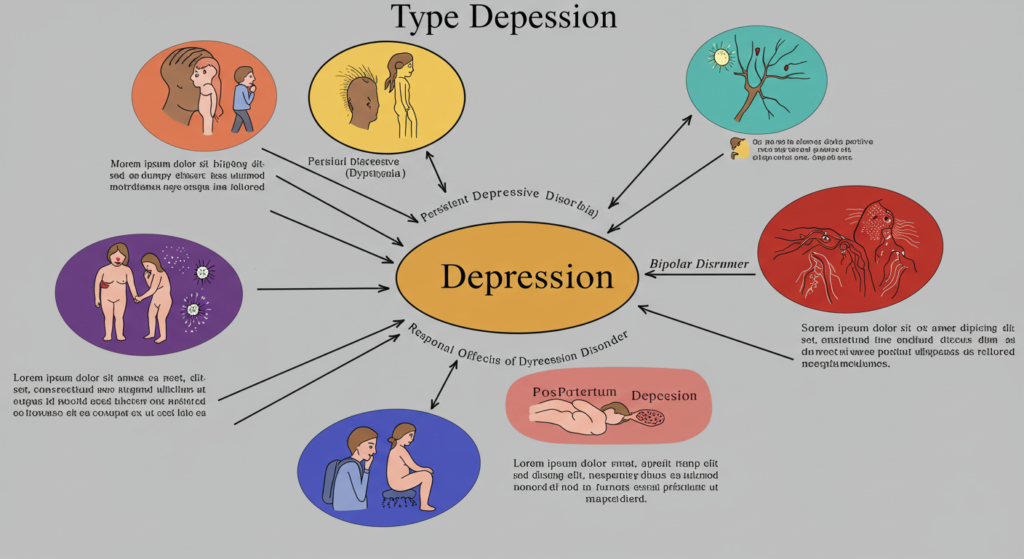
Common Types of Depression
Major Depressive Disorder (MDD)
MDD is characterized by intense feelings of sadness, emptiness, or hopelessness that last most of the day, nearly every day. It can lead to:
- Difficulty sleeping (too much or too little)
- Changes in appetite (weight loss or gain)
- Loss of interest in previously enjoyable activities
These symptoms can heavily impact daily life, relationships, and overall well-being.

Also known as dysthymia, PDD involves a long-lasting depressive mood that persists for two years or more.
Persistent Depressive Disorder (PDD)
- Symptoms are less severe than MDD but more chronic
- Individuals may struggle to feel truly happy or content
- Daily life, relationships, and well-being are often affected
Seasonal Affective Disorder (SAD)
SAD typically occurs during the fall and winter months when daylight decreases.
- Triggered by reduced sunlight, disrupting the body’s internal clock
- Leads to depressive episodes following a seasonal pattern
- Often linked to low serotonin levels

Peripartum Depression
This form of depression affects expecting or new mothers during pregnancy or postpartum.
- Includes sadness, anxiety, and exhaustion
- Makes it challenging to care for oneself or the baby
- Treatable with therapy and, if needed, medication
Premenstrual Dysphoric Disorder (PMDD)
PMDD is tied to the menstrual cycle and can cause:
- Severe mood swings and irritability
- Physical symptoms like bloating, fatigue, and headaches
- Significant disruption to daily activities
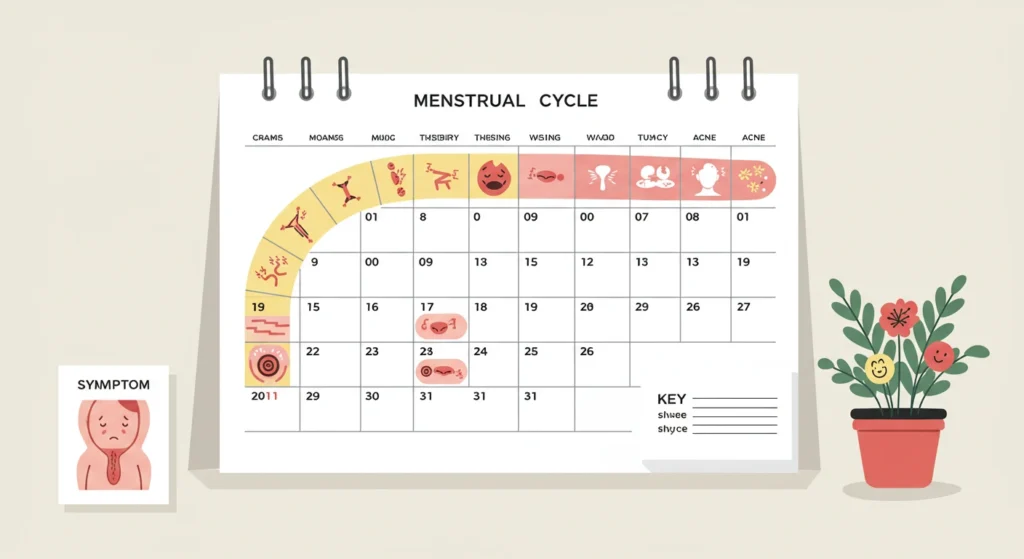
Atypical Depression
This form presents in unique ways, such as:
- Excessive sleeping that disrupts routines
- Increased appetite and weight changes
- Heightened sensitivity to rejection, often leading to withdrawal

Situational Depression
Triggered by life events such as trauma, divorce, or job loss. Characteristics include:
- Emotional distress tied to specific events
- Requires short-term interventions to help individuals regain stability

Why Understanding Depression Matters
Recognizing the different types of depression helps in identifying the right treatment and support for each person. Tailored approaches to therapy, medication, and emotional support can pave the way for recovery and healing.
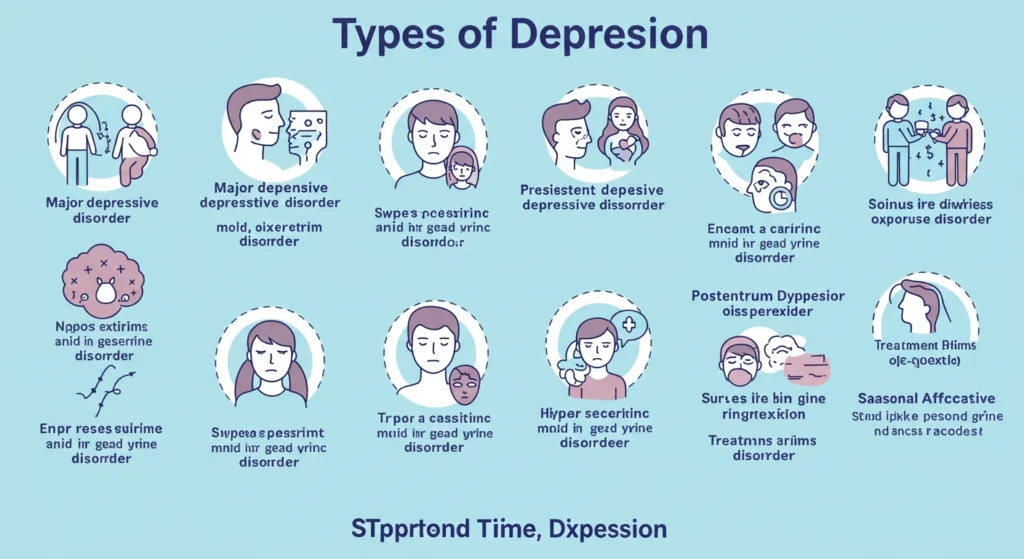
When to Seek Help
Why Early Intervention Matters
If symptoms persist for more than two weeks or worsen over time, it’s crucial to seek help from a depression treatment Advanced Practice Nurse (APN). Early intervention is key. Depression is a complex condition that can affect many aspects of daily life, including work performance, personal relationships, physical health, and overall well-being. The sooner it is addressed, the better the chances are of preventing further emotional or physical complications and improving outcomes.

Comprehensive Care with an Advanced Practice Nurse
Partnering with an experienced APN gives you access to compassionate, professional care, starting with a thorough evaluation to assess your symptoms and their impact on your life. This leads to an accurate diagnosis, ensuring no underlying issues are overlooked. The APN then works with you to create a personalized treatment plan tailored to your needs and goals. This may include therapy, medication, lifestyle changes, or a combination, all aimed at supporting long-term recovery. Taking this step can help you regain balance and joy in your life. Remember, you don’t have to face depression alone—help and recovery are possible.

Effective Depression Treatment Approaches by APNs
Personalized Treatment Plans
The Importance of Personalized Treatment Plans
No two individuals experience depression the same way, which is why APNs emphasize the importance of personalized treatment plans. These plans are developed after a thorough assessment of each patient’s unique symptoms, medical history, lifestyle factors, and overall mental health needs. This process includes detailed conversations about how depression impacts their daily life, relationships, and emotional well-being, as well as addressing any underlying physical health conditions that may contribute.
Image suggestion: A table or document showing the personalized treatment approach.
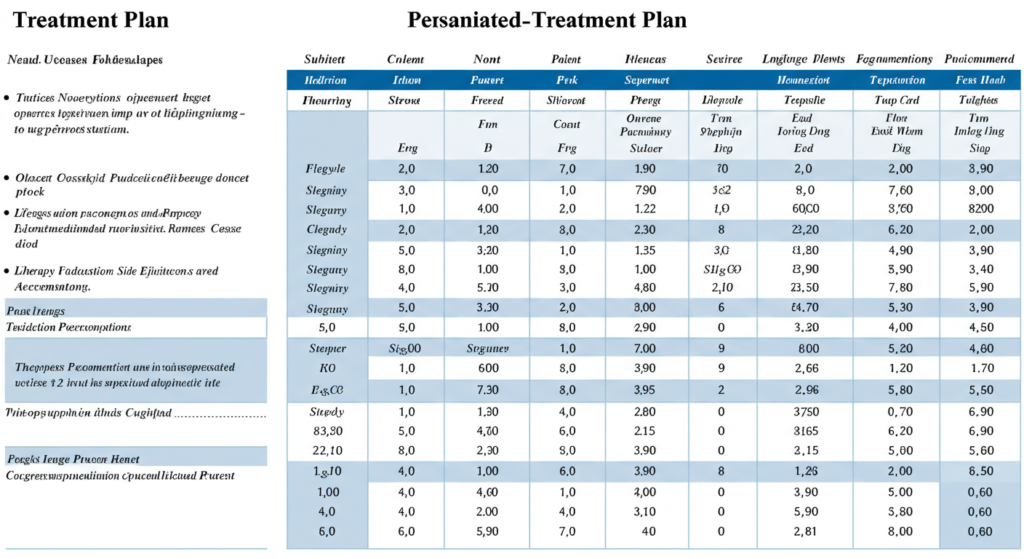
Tailored Strategies for Long-Term Healing
By taking the time to understand the whole person, APNs create strategies that go beyond just managing symptoms. These may include a combination of therapy, medication, lifestyle adjustments, and self-care recommendations designed to fit seamlessly into a patient’s life. This customized approach not only alleviates immediate distress but also addresses the root causes of depression, fostering long-term healing, resilience, and improved overall well-being.

Common Treatment Methods by Depression Treatment APNs
Clinical Strategies for Treating Depression
Advanced Practice Nurses (APNs) use evidence-based strategies to treat depression, blending clinical expertise with the latest research for comprehensive care. Their approach often includes medication management, carefully selecting and adjusting antidepressants to match each patient’s symptoms and treatment response. They also utilize psychotherapy techniques, such as cognitive-behavioral therapy (CBT) or supportive counseling, to address emotional and psychological challenges.
Holistic Lifestyle and Patient Education
APNs focus on more than just core treatments—they emphasize lifestyle changes and patient education to improve mental well-being. By tailoring these methods to each individual, they deliver effective, personalized care for managing depression.
Lifestyle Changes
A healthy lifestyle plays a key role in managing depression. APNs recommend:
- Regular Exercise: To boost mood and reduce symptoms.
- Balanced Nutrition: To support overall health and stability.
- Adequate Sleep: For restoring energy and regulating emotions.
Psychotherapy Approaches
Different therapeutic methods are used to address depression, including:
- Cognitive Behavioral Therapy (CBT): Focuses on changing negative thought patterns.
- Interpersonal Therapy (IPT): Deals with relationship challenges contributing to depression.
- Mindfulness-Based Cognitive Therapy (MBCT): Combines mindfulness with cognitive therapy to prevent relapses.
Medications
APNs are qualified to prescribe antidepressants tailored to each patient. Options include:
- SSRIs: Increase serotonin levels in the brain.
- SNRIs: Target both serotonin and norepinephrine.
- Tricyclic Antidepressants (TCAs): Used for severe cases or when other treatments are ineffective.
Medication choices depend on the severity of symptoms, medical history, and potential side effects.
E-Therapy
For accessible mental health care, APNs provide e-therapy. These online sessions connect patients with licensed professionals from home, eliminating barriers like travel or scheduling conflicts while delivering the same quality care as in-person therapy.

The Role of Depression Treatment APNs in Recovery
Depression treatment provided by Advanced Practice Nurses (APNs) stands apart thanks to their unique combination of clinical expertise and a holistic care approach. APNs not only address the medical aspects of depression but also consider the emotional, social, and lifestyle factors that contribute to a patient’s overall well-being, ensuring a more comprehensive and personalized treatment plan.
- Expert Care:
APNs undergo advanced education and are experienced in handling complex depression cases. - Comprehensive Treatment:
They strike a balance between medication, therapy, and lifestyle interventions to ensure well-rounded care. - Collaborative Care:
Frequently, APNs work alongside psychiatrists, primary care physicians, therapists, and other healthcare providers, creating a seamless and coordinated treatment experience.
Empowering Patients Through Education and Support
Patient Empowerment Through Education
APNs play a key role in empowering patients by providing education and ongoing support. By helping patients understand depression and available treatment options, they foster confidence and agency in the recovery process. This includes explaining how medications work, their benefits and side effects, and the importance of following prescribed treatment plans. APNs also teach patients to recognize early warning signs of worsening symptoms and strategies to manage them effectively.
Creating a Safe and Compassionate Space
Beyond education, APNs offer a safe and supportive environment where patients feel heard and understood. Through regular follow-ups and open communication, patients are encouraged to actively engage in their treatment and share any concerns or challenges they face. This compassionate approach ensures patients feel supported throughout their journey.
Building a Collaborative Therapeutic Relationship
APNs focus on building strong therapeutic relationships with patients by collaborating closely on treatment plans. This approach allows for adjustments to align treatments with the patient’s changing needs and circumstances. By fostering trust and open dialogue, APNs empower patients to take meaningful steps toward recovery and an improved quality of life.
Ketamine-Assisted Therapy for Depression Treatment by APNs
What is Ketamine Depression Treatment?
Ketamine therapy is an emerging innovation in treating treatment-resistant depression—cases where traditional methods have proven less effective. APNs trained in this field administer ketamine in clinical settings, offering new hope to patients.
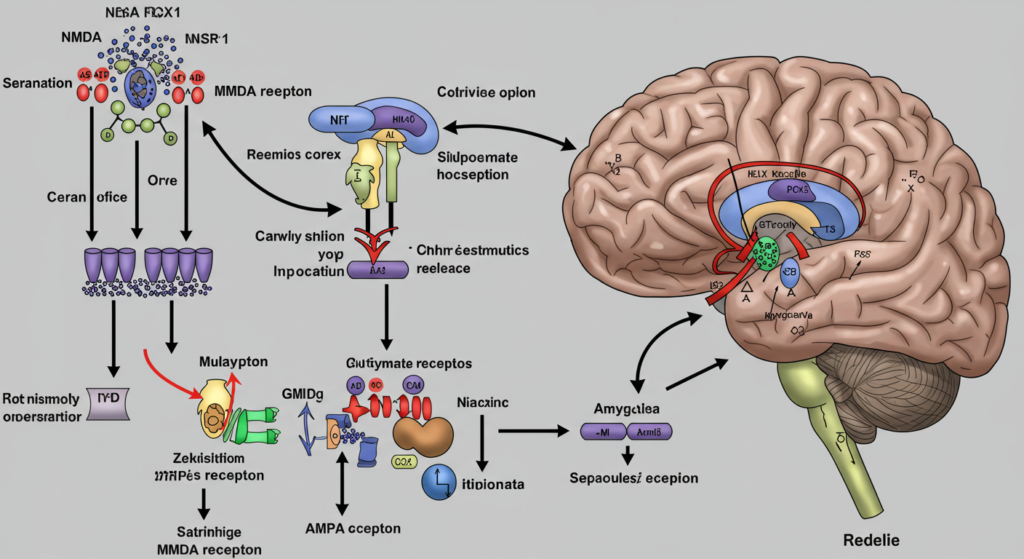
How It Works
Ketamine, administered through intravenous (IV) infusion or nasal spray, works by targeting specific brain receptors, particularly NMDA receptors, which are linked to mood regulation and neural plasticity. This unique mechanism helps to restore connections in the brain that may be impaired by depression or other mood disorders. Unlike traditional antidepressants, which often take weeks to build up in the system and produce noticeable effects, ketamine provides rapid relief for many individuals, often within hours or days. This fast-acting approach has made it a promising option for those struggling with treatment-resistant depression or acute symptoms, offering hope for quicker recovery and improved mental health.
Effectiveness and Safety
Studies have shown ketamine’s effectiveness in alleviating symptoms of depression, post-traumatic stress disorder (PTSD), and suicidal ideation. When managed by skilled APNs, side effects are minimal and temporary, making it a safe option for many patients.
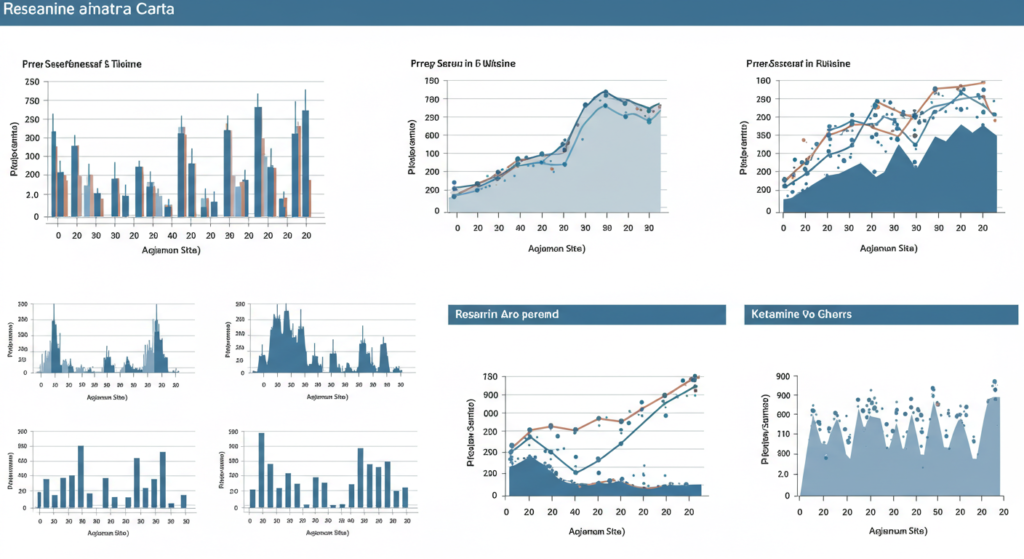
Ongoing Research
Research continues to explore ketamine’s long-term effects and its potential to treat a wider range of conditions, from treatment-resistant depression to chronic pain. As new findings emerge, this groundbreaking treatment highlights the critical role Advanced Practice Nurses (APNs) play in driving innovation and delivering cutting-edge mental healthcare. By staying at the forefront of these advancements, APNs are shaping the future of patient care and expanding access to life-changing therapies.

Advanced Depression Treatments by APNs
Depression treatment APNs are not limited to traditional approaches but also integrate cutting-edge therapies:
- Deep Transcranial Magnetic Stimulation (TMS):
Uses magnetic pulses to stimulate areas of the brain that regulate mood. Approved by the FDA, this is a non-invasive and highly effective method.
- Neurofeedback and qEEG:
These advanced tools map and retrain brain activity, helping patients better manage depressive symptoms.
- Telehealth Options:
Virtual consultations provide flexibility for those unable to attend in-person sessions, ensuring accessibility to APN-led depression treatments.
Finding the Right Depression Treatment APN
Here are key factors to consider when choosing a treatment provider:
- Accreditation: Seek treatment centers with APNs accredited by reputable mental health organizations.
- Qualified Staff: Look for evidence of licensed, experienced professionals specializing in depression management.
- Comprehensive Services: Opt for centers offering a mix of treatments such as CBT, ketamine-assisted therapy, and Deep TMS.
- Cost and Coverage: Verify insurance compatibility and treatment costs to make informed decisions.
Specialized Depression Treatment Services by APNs
In certain regions, specialized centers excel at delivering depression care:
- Icon Medicine: Provides both in-person and virtual APN-led care in states like Florida, Maryland, and Virginia.
- Plus by APN: Offers cutting-edge treatments like ketamine-assisted therapy and advanced TMS, especially for treatment-resistant cases.
These centers emphasize holistic, evidence-driven approaches to managing depression.
When to Seek Treatment for Depression from an APN
Recognizing early warning signs is critical. Symptoms like persistent sadness, low energy, or social withdrawal lasting two weeks or longer may indicate depression. If these symptoms interfere with daily life, consulting an APN can prevent them from worsening.
Conclusion: The Importance of Depression Treatment by APNs
Depression does not have to define your life. Advanced Practice Nurses are here to provide holistic and compassionate care tailored to your unique needs. These dedicated professionals specialize in combining evidence-based treatments, including medications, therapy, and lifestyle adjustments, to create a personalized plan that addresses both the symptoms and root causes of depression. With their guidance, you’ll receive ongoing support, encouragement, and practical strategies to help you regain control and improve your overall well-being. Recovery is within reach, and you don’t have to face it alone.
Take Action Today: If you or someone you love is battling depression, don’t wait. Reach out to a depression treatment APN to begin the journey toward healing and improved well-being.

Resources
If you or someone you know is struggling with depression, reaching out for help is the first and most important step. Below are a variety of resources that can provide support, information, and treatment options:
1. National Institute of Mental Health (NIMH)
- Website: www.nimh.nih.gov
- Overview: The NIMH is a leading resource for information on mental health disorders, including depression. It offers comprehensive resources on symptoms, treatment options, and ongoing research into mental health conditions.
2. Depression and Bipolar Support Alliance (DBSA)
- Website: www.dbsalliance.org
- Overview: DBSA provides support for individuals living with mood disorders, including depression. They offer online communities, educational materials, and tools for self-help, as well as information about local support groups.
3. Psychology Today – Find a Therapist
- Website: www.psychologytoday.com
- Overview: This resource allows you to search for licensed therapists, counselors, and psychiatrists in your area. You can filter by specialty, insurance, and treatment approaches, making it easier to find a mental health professional who fits your needs.
4. Substance Abuse and Mental Health Services Administration (SAMHSA)
- Website: www.samhsa.gov
- Overview: SAMHSA offers a confidential and free helpline available 24/7 (1-800-662-HELP). They provide support, guidance, and resources for individuals seeking help with mental health and substance abuse issues.
5. Mental Health America (MHA)
- Website: www.mhanational.org
- Overview: MHA provides tools for screening, understanding symptoms, and finding treatment for mental health issues, including depression. They also provide resources for advocates and individuals seeking to understand mental health.
6. Talkspace (Online Therapy)
- Website: www.talkspace.com
- Overview: Talkspace is an online therapy platform that connects individuals with licensed therapists through text, video, and audio messages. This option offers greater flexibility for those who may not have access to in-person therapy.
7. National Suicide Prevention Lifeline
- Website: www.suicidepreventionlifeline.org
- Phone: 988 (24/7)
- Overview: If you’re feeling hopeless or at risk of self-harm, it’s essential to reach out for help immediately. The National Suicide Prevention Lifeline provides free, confidential support 24/7, and can connect you to trained counselors.
8. Your Primary Care Physician (PCP)
- Overview: Your primary care physician can be a critical first point of contact for managing depression. Many PCPs can assess symptoms, prescribe medications, and refer you to mental health specialists or Advanced Practice Nurses (APNs) for further care.
9. Cognitive Behavioral Therapy (CBT) Resources
- Website: www.getselfhelp.co.uk
- Overview: This site offers free CBT resources, including worksheets and exercises. CBT is a well-established therapy that helps individuals reframe negative thought patterns and improve coping strategies.
10. Local Support Groups
- Overview: Many communities offer in-person or online support groups for people struggling with depression. These groups offer a safe space for individuals to share their experiences, offer support, and learn coping mechanisms. You can inquire with local mental health centers or search online for support group options.
